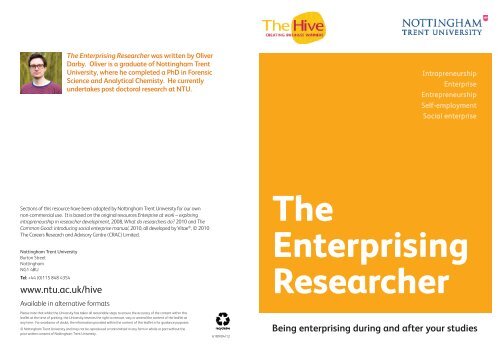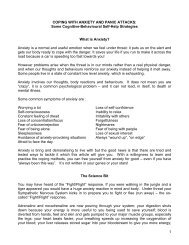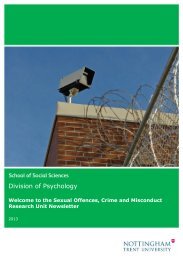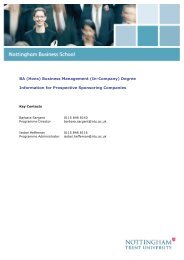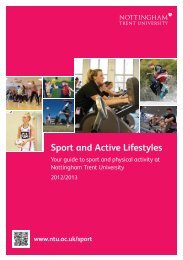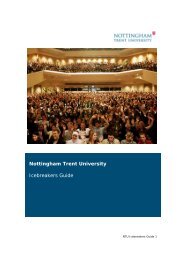Case study - Nottingham Trent University
Case study - Nottingham Trent University
Case study - Nottingham Trent University
You also want an ePaper? Increase the reach of your titles
YUMPU automatically turns print PDFs into web optimized ePapers that Google loves.
<strong>Nottingham</strong> <strong>Trent</strong> <strong>University</strong><br />
Burton Street<br />
<strong>Nottingham</strong><br />
NG1 4BU<br />
Tel: +44 (0)115 848 4354<br />
www.ntu.ac.uk/hive<br />
Available in alternative formats<br />
The Enterprising Researcher was written by Oliver<br />
Darby. Oliver is a graduate of <strong>Nottingham</strong> <strong>Trent</strong><br />
<strong>University</strong>, where he completed a PhD in Forensic<br />
Science and Analytical Chemisty. He currently<br />
undertakes post doctoral research at NTU.<br />
Sections of this resource have been adapted by <strong>Nottingham</strong> <strong>Trent</strong> <strong>University</strong> for our own<br />
non-commercial use. It is based on the original resources Enterprise at work – exploring<br />
intrapreneurship in researcher development, 2008, What do researchers do? 2010 and The<br />
Common Good: introducing social enterprise manual, 2010, all developed by Vitae ® , © 2010<br />
The Careers Research and Advisory Centre (CRAC) Limited.<br />
Please note that whilst the <strong>University</strong> has taken all reasonable steps to ensure the accuracy of the content within this<br />
leaflet at the time of printing, the <strong>University</strong> reserves the right to remove, vary or amend the content of the leaflet at<br />
any time. For avoidance of doubt, the information provided within the content of this leaflet is for guidance purposes.<br />
© <strong>Nottingham</strong> <strong>Trent</strong> <strong>University</strong> and may not be reproduced or transmitted in any form in whole or part without the<br />
prior written consent of <strong>Nottingham</strong> <strong>Trent</strong> <strong>University</strong>.<br />
6189/04/12<br />
Intrapreneurship<br />
Enterprise<br />
Entrepreneurship<br />
Self-employment<br />
Social enterprise<br />
The<br />
Enterprising<br />
Researcher<br />
Being enterprising during and after your studies
Contents<br />
Introduction ........................................3<br />
Intrapreneurship...............................4<br />
Self-employment...............................6<br />
Social enterprise.............................12<br />
If you have an idea .......................14<br />
Introduction<br />
“Much attention has been paid to the problems graduates<br />
face in finding jobs in the current economic climate.<br />
However, spare a thought for PhD students who, especially in<br />
the humanities and social sciences, may be in an even worse<br />
position. At the heart of the problem is the adverse effect of<br />
the government's cuts on universities, traditionally the<br />
primary destination for newly-minted doctorates”. [1]<br />
The environment of postgraduate studies is changing significantly, not just in the United Kingdom<br />
but globally.<br />
Nicholas Sarantakes, writes the ‘in the Service of Clio’ blog about career management. He predicts:<br />
“The job market is going to get worse for PhDs over the next five years.<br />
Graduate programmes are overproducing each year and the surplus is getting<br />
bigger and bigger. At the same time, colleges and universities are downsizing<br />
their faculty and increasing their workloads. Supply is increasing at the very<br />
same time that demand is decreasing”.<br />
These issues mean that postgraduate students must look further afield than universities for<br />
potential routes to employment following completion of their studies. It also means that the<br />
training during their <strong>study</strong> must be adapted.<br />
“Doctoral programmes in the UK have traditionally included training<br />
in research skills, particularly those most relevant to research in<br />
individual disciplines or fields of <strong>study</strong>. But this new skills agenda<br />
seeks to go much further and embraces broader generic personal and<br />
professional skills that are transferable to a range of different career<br />
paths, within and beyond research.” [2]<br />
With these current circumstances in mind, this booklet provides information about undertaking your<br />
doctoral <strong>study</strong> in an enterprising manner, allowing you to gain the greatest number of transferable<br />
skills, which will help you with future careers in academia and beyond. It also contains information<br />
about considering self-employment after graduation as an alternative career path.<br />
1. Careers for PhDs beyond academia, The Guardian, 12 August 2011, Matthew Partridge.<br />
2. Park, C (2007) Redefining the Doctorate, Discussion Paper, Higher Education Academy<br />
3
4<br />
Intrapreneurship<br />
“Intrapreneurial capabilities include gaining personal reward<br />
from seeing an idea through, spotting opportunities, having<br />
the confidence to lead or initiate change processes, taking<br />
risks and being resilient – all within an organisational<br />
context”. [3]<br />
By nature, postgraduate researchers are enterprising. They must show initiative and be<br />
resourceful. Intrapreneurship means taking these inherent skills and applying them while working<br />
as an employee (whereas an entrepreneur applies these principles to their own venture).<br />
Vitae highlighted the following capabilities specifically related to Intrapreneurship [4];<br />
Personal motivation<br />
Initiative<br />
Highly motivated<br />
Gaining personal reward from seeing an<br />
idea through<br />
Creating ideas and opportunities<br />
Creativity<br />
Seeing (recognising) opportunities that<br />
others have not seen<br />
Open minded<br />
Influencing change<br />
Problem solving<br />
Removing barriers to idea realisation<br />
Self-confidence to initiate or lead change<br />
processes<br />
Persuasion and negotiation<br />
Taking and managing risks<br />
Tolerance of ambiguity<br />
Resilience<br />
3. Intrapreneurship; enabling postgraduate researchers to drive organisational innovation, Alison Mitchell, 2007<br />
4. Vitae, Enterprise at work - exploring intrapreneurship in researcher development, 2008.<br />
Working with people<br />
Cooperating with others<br />
Managing people and expectations at all<br />
levels<br />
Excellent networking<br />
These skills should be innate in researchers,<br />
and are very attractive to both academic and<br />
non-academic employers. Annually around<br />
50% of all research graduates go into<br />
employment outside the education sector.<br />
That percentage is higher in the biosciences,<br />
physical and engineering sciences. So it’s<br />
advisable to consciously look to develop these<br />
skills during your time of <strong>study</strong>, and to consider<br />
how to best include these skills on your CV.<br />
Your core subject studies may equip you with a<br />
set of very specific skills, and this may restrict<br />
the areas of employment you are suitable for.<br />
However the vast range of transferable skills<br />
which you can develop during your period of<br />
<strong>study</strong> can open an array of alternative<br />
employment opportunities.<br />
<strong>Case</strong> <strong>study</strong>:<br />
3M Post-it Notes<br />
3M fosters intraprenurial thinking by encouraging technical<br />
staff to spend up to 15% of their time on projects of their<br />
own choosing. Known as the ‘bootlegging policy’, this has<br />
led to some of 3M’s most famous products.<br />
In 1968 3M chemist Dr Spencer Silver invented a not-so-sticky adhesive, but he<br />
didn’t know what to do with it. Spencer shared his idea with colleagues, both<br />
informally and through seminars, presenting the features and benefits of his<br />
new low-tack adhesive.<br />
For six years nobody really saw the potential of his product. Finally, co-worker<br />
Art Frey recognised a use for Spencer’s idea. During choir practice and<br />
performances, Frey’s bookmarks regularly fell out of his hymn book. Spencer’s<br />
product concept solved this problem. In 1980, Minnesota Mining and<br />
Manufacturing’s (3M) Post-it Notes product line was successfully launched<br />
across the USA, and internationally.<br />
5
6<br />
Self-employment<br />
“Having a doctorate opens all sorts of doors that you are not<br />
necessarily aware of when you start. It is fine to plan a<br />
career, but you also need to keep yourself open to<br />
possibilities you had not considered. It is good to consider<br />
that there are opportunities out there beyond research<br />
assistant, research fellow, junior lecturer etc.”<br />
Joan Smith, doctoral graduate. [6]<br />
The employment prospects for post-doctoral researchers are shifting away from the traditional<br />
routes through into academia. With this in mind it is well worth considering self-employment on<br />
completion of your studies, as a full-time occupation or as a secondary income stream to<br />
supplement part-time employment elsewhere.<br />
‘Entrepreneur’ and ‘entrepreneurship’ describes the application<br />
of enterprise skills to the problems of establishing a business or<br />
organisation. [7]<br />
Some would argue that anyone can be an entrepreneur, while others would say that anyone can<br />
be enterprising but not everyone can take these skills and apply them to entrepreneurialism.<br />
Research carried out by Zhao, Seibert and Lumpkin suggests that those who do become<br />
post-doctoral entrepreneurs share similar personality traits. The most obvious being the desire for<br />
independence and autonomy. [8]<br />
“Autonomy and independence are my main values. The<br />
money was never the motivating driver. The motivators<br />
were that I could be independent and learn new things.”<br />
Barrie Hopson, post-doctoral entrepreneur [9]<br />
6. What do researchers do? Career profiles of doctoral graduates, Vitae, 2009<br />
7.www.vitae.ac.uk/CMS/files/upload/What-do-researchers-do-Career-Profiles-of-doctoral-entrepreneurs-2010.pdf<br />
8.Zhao, H, Seibert, SE, & Lumpkin, GT (2010) ‘The Relationship of Personality to Entrepreneurial Intentions and Performance: A Meta-Analytic Review’. Journal of Management,<br />
36(2), pp. 381-404.<br />
A Vitae <strong>study</strong> of post-doctoral entrepreneurs highlighted that<br />
none of those interviewed had made a definitive choice early in<br />
life, a career was something which was built rather than<br />
something that was chosen. [7]<br />
“I’m a ‘what’s next?’ kind of bloke. This requires some<br />
sense of direction, to think that it is more likely to be ‘over<br />
here’ than ‘over there’ but I’ve never been able to give an<br />
answer to the question ‘what do you want to be doing in<br />
ten years’ time?”<br />
Bill Law, Educational Sociology. [7]<br />
The skill set of the entrepreneur<br />
The Entrepreneurship Forum of New England (EFNE) suggests the following six qualities of an<br />
entrepreneur [9]:<br />
Dreamer: A big idea of how something can be better and different<br />
Innovator: Demonstrate how the idea applied outperforms current practice<br />
Passionate: Expressive so the idea creates energy and resonance with others<br />
Risk taker: Pursues the dream without all the resources lined up at the start and distributes the risk<br />
Dogged committer: Stays with executing the innovation to make it work<br />
Continuous learner: Constantly exploring and evolving to do best practice<br />
A suite of online tutorials is hosted on NOW now.ntu.ac.uk, including an online test to assess<br />
whether you may have inherent entrepreneurial attributes:<br />
1. On your NOW homepage locate the ‘General Resources’ area and click on ‘Resources’.<br />
2. Click on ‘Learning Development’.<br />
3. Click on ‘Online Tutorials’.<br />
4. Under ‘Online Tutorials’ select the ‘Research Skills Online’ button and click on ‘Select’ lower<br />
down the page.<br />
5. Select the ‘ENTREPRENEURSHIP 1 : ARE YOU AN ENTREPRENEUR? link (opens new window)’<br />
9. www.efne.org<br />
7
8<br />
<strong>Case</strong><br />
<strong>study</strong>:<br />
Oliver Dalby<br />
Forensic science and analytical chemistry PhD graduate<br />
“I developed a passion for photography during my undergraduate<br />
Forensic Science degree, after taking a Forensic Photography<br />
module. I went on to work at a photo lab part-time while <strong>study</strong>ing.<br />
Upon graduating I decided to take a HNC in Photography, which I<br />
completed before starting my PhD.<br />
“I kept taking pictures while <strong>study</strong>ing for my doctorate and my passion for the activity<br />
grew. I finally decided to try and make some money from photography after attending<br />
a careers event put on by the <strong>University</strong> that highlighted self- employment as a potential<br />
career choice.<br />
“I signed up to The Hive’s HeadStart programme here at <strong>Nottingham</strong> <strong>Trent</strong> <strong>University</strong> in<br />
October 2010. The programme is designed to help you develop your business idea and<br />
make it viable. This was an invaluable step in helping me get my ideas up and running.<br />
“Since taking the course I have gained employment as a part-time research associate, a<br />
part-time research enterprise champion and have gained several photographic<br />
commissions.<br />
“Being part-time self-employed has been amazingly liberating, allowing me to draw an<br />
income from my passions and to apply some of the many transferable skills I developed<br />
during my doctorate to something in a completely different field. While working in<br />
research part-time has allowed me to apply the core research skills that I developed<br />
during my doctoral studies”.<br />
<strong>Case</strong> <strong>study</strong>:<br />
Nikolaos Markoulakis<br />
Arts and Humanities PhD graduate<br />
“In 2004 I started the Spartan Journal, an open access<br />
periodical for a small group of ancient Sparta’s history friends<br />
and enthusiasts. It was initially a curiosity and a great number<br />
of questions concerning the development of this publication<br />
that led me to The Hive.<br />
“The Hive evaluative process of all my business<br />
ideas led to the creation of Markoulakis<br />
Publications. Without the encouragement and<br />
promotion received from The Hive, Markoulakis<br />
Publications, and my self-employability would<br />
have never been a reality. I have begun two<br />
more publications and a continental philosophy<br />
series and will shortly be releasing the first title of<br />
the series on ethnography and anthropology.<br />
“My experience as a PhD researcher at NTU in<br />
the School of Arts and Humanities boosted my<br />
ability to act as an editor and peer-reviewer for a<br />
number of the published material. My studies<br />
have also helped me to better understand the<br />
needs of academics to gain access to the<br />
information world via publications as required by<br />
the UK academic system. This knowledge has<br />
altered the Publications’ design management of<br />
Markoulakis Publications, which now seeks to be<br />
open, supportive and free of any production fees for young scholars from UK and<br />
overseas. That point, in my opinion, is greatly important as the financial crisis<br />
continues to endure and starts to impinge on academia.”<br />
5. www.intrapreneurshipinstitute.com/resources/intrapreneurship-success-case-<strong>study</strong>-3m-post-it-notes/<br />
9
10<br />
Social enterprise<br />
“Social enterprises are businesses. They make and do things<br />
that earn money and make profits like any business. It is<br />
how they work and what they do with their profits that are<br />
different: working to make a bigger difference, reinvesting<br />
the profits they make to do more good.” [10]<br />
This diagram illustrates where social enterprises sits in relation<br />
to typical businesses and charities. [11]<br />
Typical businesses: many have social<br />
aims and benefits, including donating<br />
to charity, but this is not central to<br />
what they do or why they exist.<br />
Social enterprise: have a primary social<br />
and environmental purpose, generate<br />
income by trading, with surpluses<br />
principally re-invested for that purpose<br />
in the business or community.<br />
10. www.socialenterprise.org.uk/data/files/publications/Social_Enterprise_Explained_-_May_2011.pdf<br />
11. The Common Good Manual, 2010 – Vitae<br />
Traditional charities, community and<br />
voluntary organisations; primarily rely<br />
on fundraising, grants and donations.<br />
<strong>Case</strong> <strong>study</strong>:<br />
Atul Shah<br />
Atul Shah runs Diverse Ethics, a social enterprise<br />
focusing on cultural diversity<br />
“I originally took a doctorate in accountancy and finance.<br />
After my doctorate I took up several lectureship positions in<br />
various universities around the UK and America for about ten<br />
years. Towards the end of this time I started an international<br />
magazine on issues of diversity and ethics, which led up to the<br />
creation of my social enterprise.<br />
“I came to realise how tricky the UK academic career ladder could be for people<br />
with an independent identity. Despite the fact that I was breaking new ground,<br />
and wrote several innovative research papers I was unable to secure a chair. I felt<br />
that I could only really satisfy my intellectual appetites and ethical conscience by<br />
moving out on my own. I have first-hand experience of life and work in the UK as<br />
a thinker and in a cultural minority. It is this background, together with my<br />
experience which has fed into the setting up of a social enterprise called Diverse<br />
Ethics. We provide expert information, research, training and consultancy services<br />
for public and private organisations on diversity issues, especially focusing on<br />
culture change and leadership.<br />
“Challenging aspects have been selling what we do, this is tough because<br />
researchers tend to focus on complexity but selling requires a focus on sound bites<br />
and practical aspects. Attending Business Link courses has been useful, but there<br />
has been a lot of self-teaching as well. I love the independence but it is also lonely<br />
and I miss talking to people. My doctorate helped me to understand the barriers<br />
to learning. When you are brought up in a very structured textbook oriented<br />
method of learning, the doctorate frees you because you are able to develop an<br />
independent voice and different method of thinking. This started me on a journey<br />
to revisit the culture I came from where I discovered huge scientific wisdom.” [7]<br />
11
<strong>Case</strong> <strong>study</strong>:<br />
Joanne Whitaker<br />
Joanne Whitaker runs Faveo, a company that<br />
manufactures an innovative backless bra.<br />
“The area of my doctorate was Biomedical Sciences –<br />
specifically looking at antigens that could be important in<br />
developing cancer treatment vaccines. Much of your first<br />
degree was learning to pass tests, but at doctoral <strong>study</strong> level I<br />
liked that you were in control of your own destiny and your<br />
own learning. You could choose your path and you would get<br />
out what you put in.<br />
“I had become a bit disillusioned with academia on noticing that career<br />
progression was more limited for women – female heads of department within<br />
science disciplines were rare although postgraduates made up more than 50%<br />
of the intake. I decided I didn’t want to fight that battle, instead deciding to<br />
combine my science and business knowledge. Whilst my career involved<br />
working with inventors to bring new products to market, I had myself invented a<br />
new product in my spare time – a gravity defying bra! It took me about three<br />
years to raise investment, recruit staff and start selling the finished product (D+<br />
Perk Ups).<br />
“You have to get the product to a certain stage,<br />
and spend quite a bit on IP costs before it is ready<br />
to sell. I found that my doctoral <strong>study</strong> really<br />
taught me to think logically and carry out<br />
effective research and development – some very<br />
transferable skills. There were quite a few<br />
challenges along the way but my experience in<br />
technology transfer for universities and the NHS<br />
was the perfect background I needed as it taught<br />
the basics of doing business in<br />
this way. Inventing and<br />
launching a new product<br />
requires a broad range of skills:<br />
financial, business, technical, IP,<br />
funding, research, development,<br />
people management, customer<br />
service and many more.<br />
“All my little jobs during college,<br />
my degrees and full-time work<br />
prepared me for the experience<br />
of running a company. My<br />
advice is to say that learning is<br />
never a waste of time – you<br />
never know when it might come<br />
in handy!”<br />
12 13
14<br />
If you have an idea...<br />
The Hive is <strong>Nottingham</strong> <strong>Trent</strong> <strong>University</strong>’s purpose-built<br />
Centre for Entrepreneurship and Enterprise. Since 2001<br />
we have helped more than 250 people to start up<br />
companies, and more than 70% of these businesses are<br />
still trading today.<br />
If you have an idea that you think may become a business or would like<br />
any help or advice on entrepreneurship and enterprise please contact us:<br />
The Hive<br />
<strong>Nottingham</strong> <strong>Trent</strong> <strong>University</strong><br />
Burton Street<br />
<strong>Nottingham</strong><br />
NG1 4BU<br />
Tel: +44 (0)115 848 4354<br />
Email: thehive@ntu.ac.uk<br />
www.ntu.ac.uk/hive


